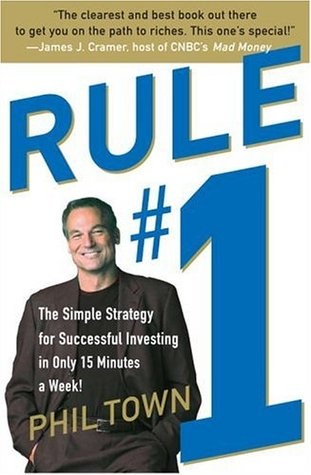The Most Critical Rules For Successful Trading And Investing
Post on: 20 Июль, 2015 No Comment

(By Aristofanis) I have read many books and articles offering trading tips and rules, but I believe a trader (or investor) will be completely lost while trying to follow all these rules. Therefore, based on my experience, I have skimmed the most important ones, which are easy for someone to keep in mind. The rules apply both to investing and trading so I will use these two terms interchangeably.
1. Never let a significant profit turn to a loss (George Kleinmann)
It takes great judgment and of course a share of luck to execute a trade that will return a high yield. If this occurs, it is almost inevitable that, at some point, the profits will start to evaporate. When that happens, it will be a crime to let all profits evaporate.
This is a classic mistake of novice traders, particularly in a stock market bubble. They become so enthusiastic about the unusually quick profits that they refuse to cash in the profits when the bubble bursts. As the decline from a top is always steep, they refuse to sell at a price markedly lower than the recent high and insist on waiting for the price to return to its previous level. However, in reality the stock may never return to its bubble level or it may take many years to retrieve that level.
For instance, it took Coca Cola (KO ) 5 years, from 2003 to 2008, to climb from $18 to $32, but only one year to erase all these gains. It would be a shame to lose all the profits without acting at all. It is well known from experience that bear markets are much steeper than bull markets. Therefore, one should be decisive enough to pull the trigger promptly when profits begin to evaporate quickly. Whether one should cash in 50% or 70% of the maximum profit, it is really personal. However, it is critical that a significant portion of the profit is locked; otherwise, the investor will never succeed and will most likely go bankrupt more than once throughout his/her investing career. This is true because Coca Cola may have just erased all its gains, but other companies have fallen even 99% from their peak level (Enron went to zero).
2. Never buy a stock with weak fundamentals (Warren Buffett)
It is only human nature that a trader is tempted to buy a stock when it falls to an important support level, which has held firm in numerous occasions. However, if the fundamentals are really weak, which is usually the case when a stock repeatedly visits a low level, the stock will ultimately break below support, thus entrapping the trader. It is also human nature that a trader is tempted to buy a stock when it falls to a new record low as he/she considers this unprecedented price to be a great bargain. However, there is usually a very good reason that the stock is at an all-time low and most often the trader will face great losses in a short period.
Furthermore, if an investor does not believe in the fundamentals of a company and just buys the stock for a quick profit, it is certain that the investor will throw a towel at the first significant drop of the stock and will sell it at a loss in order to regain a calm sleep.
3. A big trading size is always a mistake
Investors should allocate a small portion (no more than 6%-10%) of their total capital to each trade. Otherwise, they run the risk of getting scared too easily during a temporary market headwind and will likely be forced (by human nature!) to close their position at a loss even though their trade was good and would eventually yield a profit. It is really self-devastating to see the market going in the direction you predicted just after you threw the towel.
4. Always cut losses early

When a trade moves in the opposite direction from the one predicted, it is painful to admit being wrong, and close the position at a loss. Human nature dictates to wait until the price reverses and returns to the breakeven point while also covering the commissions we paid. We will often be lucky, and the random market volatility will help us exit the trade without a loss. However, in the few occasions that the trend will not reverse the result will be disastrous. One bad trade will erase the profits of several trades, which is a recipe for bankruptcy, definitely not for success.
5. Breakout from consolidation (All books of technical analysis)
This is a technical rule but it is so simple and so important that I could not help including in this article. When a stock trades within a well defined range for a significant period, traders usually take advantage of the situation and try to buy at the lower level of the range and sell at the upper level. After some time, it seems really funny making a profit so easily.
However, when there is a fundamental change in the earning power of the company (positive or negative), the stock will break out from consolidation. As soon as it breaks out, the trader should go with the flow because this is a reliable signal most of the time. Sometimes the stock will retrace back to the range limit but will not return inside the range. If it indeed does not return shortly within the consolidation range, the odds favor a good move in the direction of the breakout. The breakout often occurs without any justification from news, which usually comes only after a great part of the stock move has developed.
There are 2-3 additional rules, which are technical and less important than the above fundamental rules and hence I would not like to include them in this article. If someone always follows the above rules, then good performance is (almost) guaranteed as long as the economy does not return to the caveman period.
One might claim that the above rules are quite reasonable, and hence no one should have problem obeying them. The trap is the fact that human nature quite often forces someone to break these rules. For instance, as mentioned above, when a stock bounces multiple times from a strong support level, the trader is tempted to buy the stock the next time it falls to that level. However, if the fundamentals are really weak, the stock will eventually break below support and the trader will be trapped. Even worse, human nature will make it very hard for the trader to admit the mistake and sell at a loss and hence the trader is likely to insist on the wrong position and realize an even greater loss. Therefore, the good investor or trader has to beat the inherent human nature in order to follow the above rules and achieve a superior performance.














